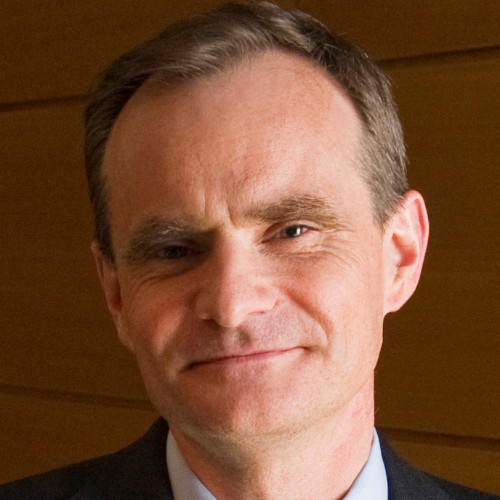On Monday, October 9, 2023, Simon Johnson from the MIT Sloan School of Management joined us for his talk, “Can We Redirect Technological Change? When, How, and to Achieve What Exactly?”
Johnson discussed lessons and implications from his two recent books: Power and Progress: Our Thousand Year Struggle Over Technology and Prosperity (co-authored with Daron Acemoglu, published in May 2023), and Jump-Starting America: How Breakthrough Science Can Revive Economic Growth and the American Dream (co-authored with Jon Gruber, published in 2019 and used in drafting the 2022 Chips and Science Act).
Beginning in 1940, the federal government demonstrated, beyond any reasonable doubt, that the path of innovation could be altered – initially to support military objectives, and then to build national scientific capacity. For decades, we used this capacity to strengthen national security and to deliver shared prosperity. Since 1980, however, the impact of technological innovation has resembled much earlier historical patterns, in which a few people gain a great deal while most people enjoy limited benefits – and some lose everything. With the rapid development of artificial intelligence, we are again grappling with a central question of the past 1,000 years. Are there ways to harness automation so that its benefits are shared more broadly? How can we create more good jobs? And how does the potential direction of technological change affect the U.S. position in the world, in terms of both broad geopolitics and our ability to defend ourselves against potential threats?
Related: Can we have pro-worker AI? Choosing a path of machines in service of minds (Policy memo)

Simon Johnson is the Ronald A. Kurtz (1954) Professor of Entrepreneurship at the MIT Sloan School of Management, where he is head of the Global Economics and Management group. In 2007-08 he was chief economist at the International Monetary Fund, and he currently co-chairs the CFA Institute Systemic Risk Council. In February 2021, Johnson joined the board of directors of Fannie Mae.
Johnson’s most recent book, with Daron Acemoglu, Power and Progress: Our 1000-Year Struggle Over Technology and Prosperity, explores the history and economics of major technological transformations up to and including the latest developments in Artificial Intelligence.
His previous book, with Jonathan Gruber, Jump-Starting America: How Breakthrough Science Can Revive Economic Growth and the American Dream, explained how to create millions of good new jobs around the U.S., through renewed public investment in research and development. This proposal attracted bipartisan support.
Johnson was previously a senior fellow at the Peterson Institute for International Economics in Washington, D.C., a cofounder of BaselineScenario.com, a member of the Congressional Budget Office’s Panel of Economic Advisors, and a member of the Federal Deposit Insurance Corporation’s Systemic Resolution Advisory Committee. From July 2014 to early 2017, Johnson was a member of the Financial Research Advisory Committee of the U.S. Treasury’s Office of Financial Research (OFR), within which he chaired the Global Vulnerabilities Working Group.
“The Quiet Coup” received over a million views when it appeared in The Atlantic in early 2009. His book 13 Bankers: the Wall Street Takeover and the Next Financial Meltdown (with James Kwak), was an immediate bestseller and has become one of the mostly highly regarded books on the financial crisis. Their follow-up book on U.S. fiscal policy, White House Burning: The Founding Fathers, Our National Debt, and Why It Matters for You, won praise across the political spectrum. Johnson’s academic research papers on long-term economic development, corporate finance, political economy, and public health are widely cited.
“For his articulate and outspoken support for public policies to end too-big-to-fail”, Johnson was named a Main Street Hero by the Independent Community Bankers of America (ICBA) in 2013.